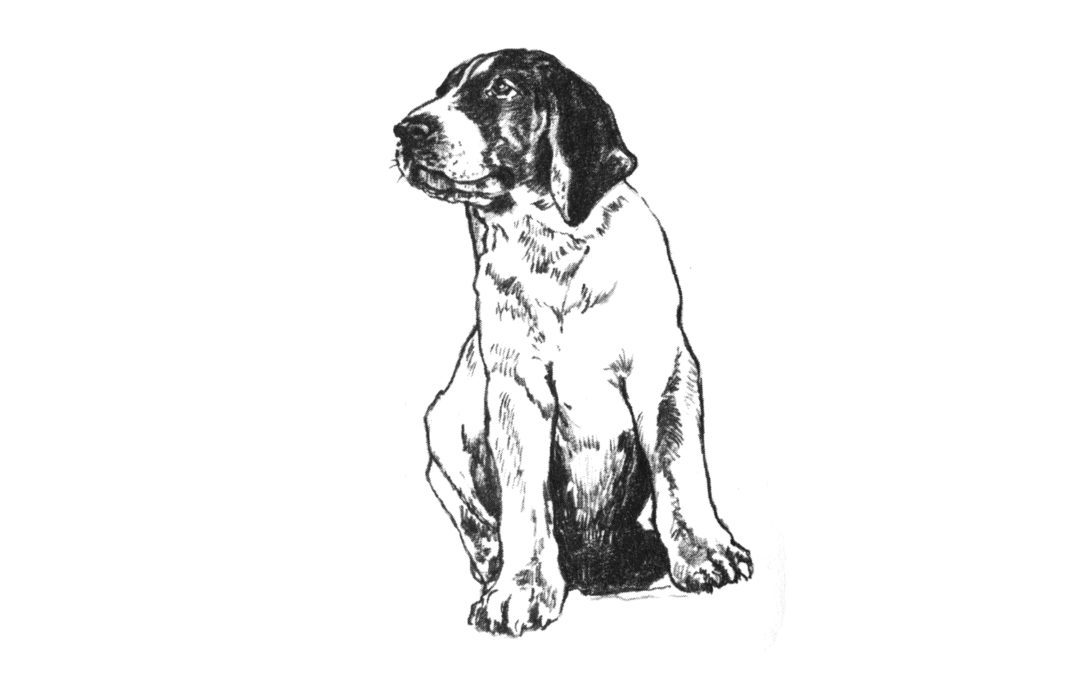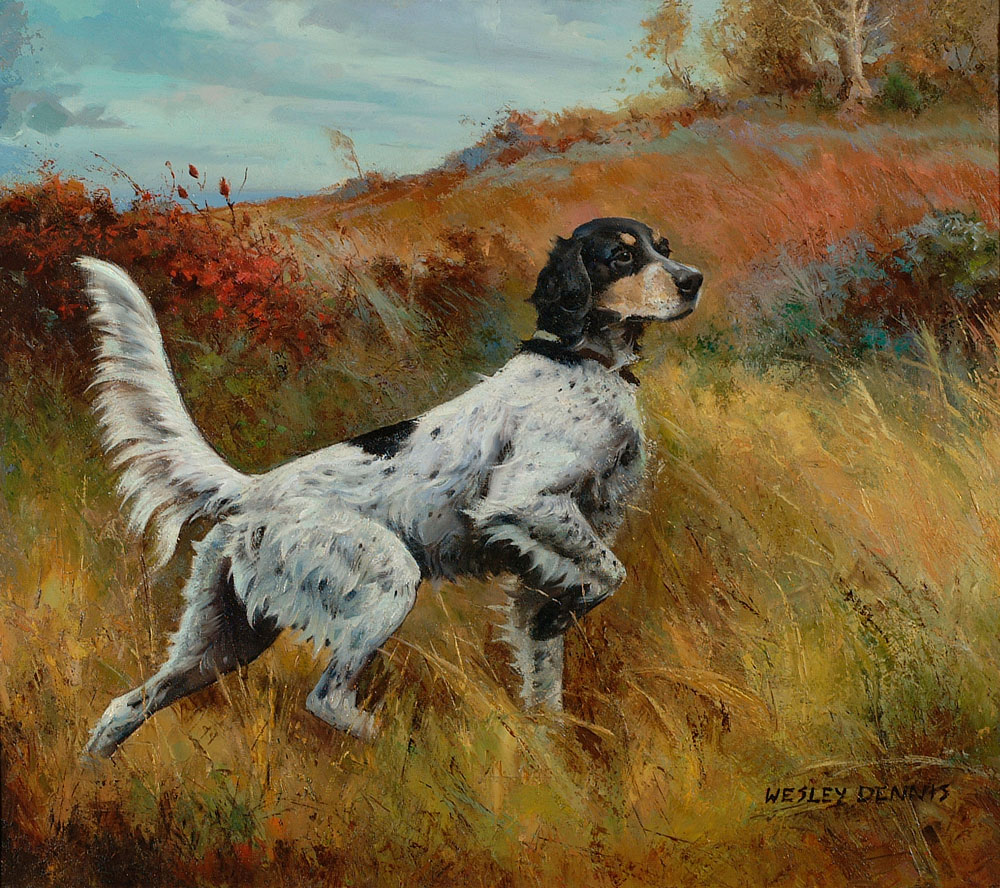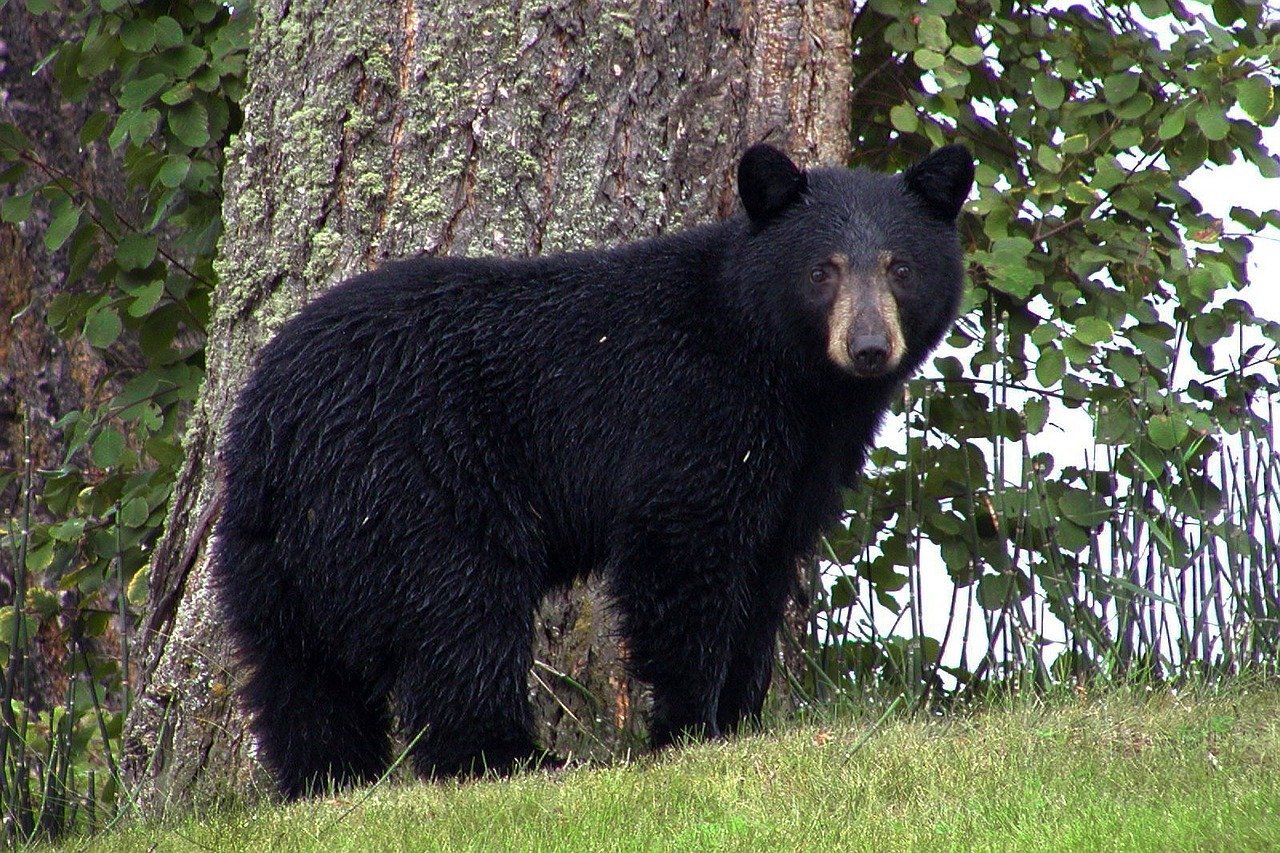I think a dog’s pleasure in scenting game is certainly as keen as our seeing it.
How many birds do you think there are in it?” I asked Jake.
“Forty if there’s one,” he said.
I believed him; for Jack owed me nothing, and he is not a farmer. To a farmer — at least, to one who does not hunt — a covey of quail always has 40 birds, just as to an amateur deer hunter every buck weighs 200 pounds.
“There must have been two coveys together,” I suggested.
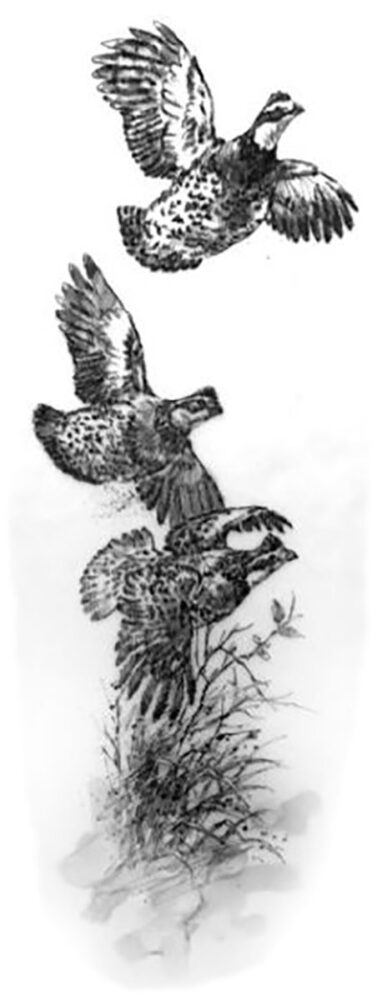 “Then they’ve been together for a long time,” he said. “And don’t you know how birds quarrel when two flocks come together? They acted like one covey.”
“Then they’ve been together for a long time,” he said. “And don’t you know how birds quarrel when two flocks come together? They acted like one covey.”
“Are you guessing, Jake, or did you count them?”
“Well, I’ll tell you. I first saw a bunch of five or six run across the old road by the sawmill; then I counted 29 birds cross. Then, after I had come up to the place, several others I had not seen flew up. There must be 40.”
During the autumn Jake does some rather skillful trapping, and while he never wastes a shell on a quail, he condescends to notice the birds. I knew, therefore, that he was not describing to me meadowlarks or killdeer, as some other hopeful informants have done. These quail were evidently out by the old sawmill by the creek, and as that particular region was singularly hunterless, I felt certain that the covey must be intact. It seemed as if a regular heyday or mayday of a time was ahead. But I had no dog.
All I had was Star, and, to be very exact, the day I heard about this quail camp meeting Star was three months old. What I managed to teach him was to love the sound of a .410 shotgun, to delight in picking up the English sparrows that fell before it and to know that I would whip him if he didn’t mind me. The youngster’s education was beginning, but he had a long road to travel ere he reached stately doghood. He had never been in the field, but in my yard he had made life rather lively for an old barred-rock hen and her brood. These chicks he persistently, even monotonously, pointed and as he would come to a stand his right forefoot would come up prettily. Several times I saw him lose his balance while going through this performance.
But to return to the big covey. My decision about it was speedy: I would repair that very afternoon to the old sawmill, and Star would repair with me. I would do most of the repairing, both while we were in the field, and then upon the pup, after our return home, I supposed.
Three miles in our Ford roller-skate brought us into the birdy country. The landscape is typical of the fruitful regions of southern Pennsylvania. The old road was bordered by old fences grown to oak-bushes, sumac — now aflame with autumn-colored foliage and clustered berries — blackberry canes and the like.
On the right lay a cornfield with the brown shocks waiting to be plundered by the farmer; on the left lay a field of wheat stubble and ragweed; and if there’s a better feeding-ground for quail, take the lead and I’ll follow fast. Beyond the wheat field was a slow-winding creek, overhung with sycamores and shellbarks. A heavy woodland lay at the far end of the cornfield. It was bird country. I was a bird hunter. But what about the bird dog?
During the drive Star had lain on the seat beside me. He looked small enough to crawl into the pocket of my hunting coat. He was not at all sure that he liked riding in a Rolls-Rough. When I looked down at him, his eyes seemed rather bright, undetermined and apprehensive. He made me feel that I ought to be ashamed to bring a baby out on a tear like this one.
When Star and I alighted from the car, it was four o’clock of a late October afternoon. The air was still and damp with a penetrating full dampness. The tattered gold of the frost-killed foliage hung motionless. It was the kind of afternoon that made me know that wheresoever the foot of a quail would tread, thereupon verily should be left a hot scent. On such an afternoon a trained dog has it easy with birds. But what could I expect of my tiny companion?
Honestly, when I set him down in the road and saw him shiver; when I noted the alarming difference in size between him and the roadside briars; when he gazed at me as if I was his last friend, and he had just lost me — then I began to think that I might have been wiser had I left the infant at home. Nor were my feelings soon reassured, for in the wheat stubble which we now entered, Star was submerged. He was so little that a dewberry vine threw him headlong. After that encounter he listed to leeward. I felt as if I was not hunting birds but trying to kill off the makings of a good dog.
However, we managed to beat out the stubble pretty well. The birds were not in it. Then we turned toward the creek. The long and level rays of the red sun were firing the woods and on the gliding waters were writing scattered messages in many colors. Through the damp woods we trudged, Star enjoying the respite from the tall ragweed. We came down to the edge of the creek, and there the pup drank fearsomely from the mighty waters which stretched full 20 feet broad before him. It was while Star was assuaging himself in this pure Volstead fashion that I heard a sound which never fails to thrill the sportsman. I heard quail moving in damp leaves; distinctly I heard the excited chittering of the covey.
“Jake’s covey,” I said. “Forty birds, and if they fly past me, they will likely knock me down with the blast of wind from their wings.”
I did not move; I looked and listened. It is a grateful feeling to have, when one is well-nigh licked — the feeling that perhaps after all there is going to be some shooting. At last I made out the birds. They were on the farther side of the creek. They had evidently come down to drink before going to roost. What were they about to do? Would they travel over land to the roost, or would they fly? Old birds love to fly to the roost, especially if they think there is trouble to them if they stay on the ground. Star, unconscious of my great discovery, lifted his face and looked at me drowsily. The baby was sleepy. The sun was about to go down, and he wanted to crawl into his box at home.
Whatever was to be done had to be done quickly. The misty October twilight would soon fade. The birds would be gone. Stooping down I picked up Star. I would wade the creek and flush the birds. Before I stepped into the water I tried to locate them once more. But they were gone. They had not taken wing. They had given me the slip. To give a hunter the slip is a quail covey’s readiest accomplishment, especially at sundown, and more especially when a man does not have a dog. O’, for a real dog!
As I waded the quiet stream Star shivered in my arms and snuggled very close to me. I was afraid he might be asleep before I reached the farther bank. It was dusky there under the sycamores. A screech-owl swooped down over our heads and snapped his bill at us. Fresh-fallen shellbarks on the bank gave the air a spicy tang. I love October twilights, with their winy fragrances, their haunting mists and the gloomy gold of their waning forests.
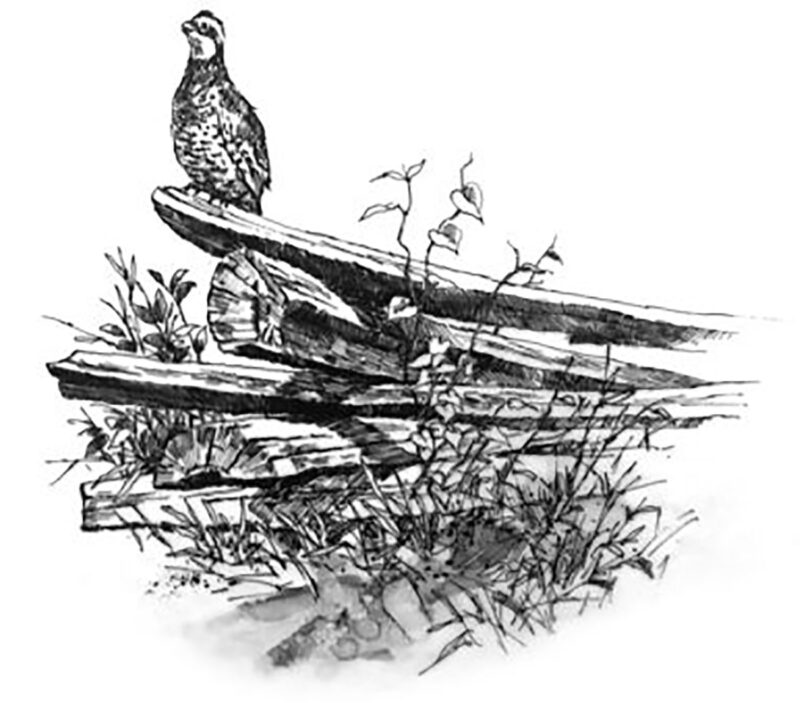 Reaching the farther bank, I walked carefully toward the spot where I had seen the quail. Of course they were not there. The low bushes and few briar canes were not dense. Gently the bank sloped away eastward, and as I looked toward its top I saw the fringe of light which marked where it joined a field where grew broomsedge. It was perhaps 60 yards from the creek to the broomsedge.
Reaching the farther bank, I walked carefully toward the spot where I had seen the quail. Of course they were not there. The low bushes and few briar canes were not dense. Gently the bank sloped away eastward, and as I looked toward its top I saw the fringe of light which marked where it joined a field where grew broomsedge. It was perhaps 60 yards from the creek to the broomsedge.
“That’s where they are,” I said to myself, “but I should have been an hour earlier. They’ve walked up this slope and have gone out in the field to roost. Star, old fellow, we’re on the hotfoot now for some fun.”
Then I stopped to think. If I went blindly on, the chances were that I would miss the birds. It seems an easier thing to blunder on birds unaware than to follow them deliberately and to flush them. The time allowed me was very short; the dog allowed me was likewise. A man, however, must always yield to a dog in at least one respect: his nose is poor. I remembered that Star, sleepy and tired and snuggly as he was, and apparently helpless, had a nose. Therefore, I decided to trust him to take me to those twilight birds that had just done the vanishing act to perfection.
I put the puppy down where I knew the trail must be, and in a moment he had the scent. It must have been strong, for the pup waked up amazingly. He started up the bank; I followed like the inferior being that I really was in this business. Star took the very trail that I should have followed without him, but when he came within 30 yards of the sedgefield, now glimmering before me in a soft, red afterglow, he turned abruptly to the right.
“Hold up, boy,” I said, “you’re on the wrong trail. They’ve gone up this way.”
But the baby seemed sure of himself. He crawled under a bush; he struggled with a fallen briar; but he went on — sure of himself. I was so interested that I came to the margin of the old field before I realized it, and I discovered that we were full 50 yards farther to the hillside. When Star got to the brink of the grass he did a thing that is indelibly imprinted upon my memory: he lay flat down on his little water barrel. Something told me that he was on a point. I saw him shiver, and this time it must have been from the excitement of drinking in all that dewy aroma that the big birds had just left. I think a dog’s pleasure in scenting game is certainly as keen as our seeing it. Star lay still and enjoyed himself; I slipped up my safety and stepped forth into the still-bright world of the lonely sedgefield.
A bog cock quail got up under my feet; another whirled out of the grass. They headed straight over the field and against the clear skyline. Then other birds got up, just by twos and threes. They seemed deliberate. Without stirring from where I first fired, I was able to down five birds. Nor had little Star stirred. I might call him a setting star were I a believer in puns. I thought he was simply bewildered by what he had led me into, but perhaps he may be given the credit of understanding he should not break point while birds were before him.
All the birds that flushed alighted not far off in the field, and almost immediately they began calling. Star and I advanced upon them, and the shooting was easy and yet fast. The skyline was fading, the birds were big ones, and they now seemed to realize that getting away was the part for them to play. Nevertheless, the chances were many, and the limit for the day was soon reached. As I picked up my last bird, I looked for Star. Until that moment I thought he had been close at my heels. He was not in sight, but a few yards off I heard a queer little mournful howl.
He thought he was lost in the tall grass, and was duly notifying me of his plight. I gathered him in my arms, and soon we were retracing our way across the stream and toward the car.
“Star,” I told him, “when we started in here this afternoon, you were an ignorant cub; now you’re a made dog. If you hadn’t turned to the right on the hill back yonder, I never would have found those birds in time to salute them, and Star, I take my hat off to you, you and your parents of good blood and breeding; we know each other now and mutual confidence is established.”
And that’s the true story of the baby’s first outing.
Editor’s Note: this story was originally published in the August 1922 issue of Field & Stream, and also appeared in Bird Dog Days, Wingshooting Ways (2016), edited by Jim Casada.
 This marvelous collection features stories from some of America’s finest and most respected writers about every outdoorsman’s favorite and most loyal hunting partner: his dog. For the first time, the stories of acclaimed writers such as Richard Ford, Tom Brokaw, Howell Raines, Rick Bass, Sydney Lea, Jim Harrison, Tom McGuane, Phil Caputo, and Chris Camuto, come together in one collection.
This marvelous collection features stories from some of America’s finest and most respected writers about every outdoorsman’s favorite and most loyal hunting partner: his dog. For the first time, the stories of acclaimed writers such as Richard Ford, Tom Brokaw, Howell Raines, Rick Bass, Sydney Lea, Jim Harrison, Tom McGuane, Phil Caputo, and Chris Camuto, come together in one collection.
This is a delightful, handsome volume that captures the wild spirit of dogs and those who love them.This is the story of the author’s powerful connection to his family, friends and the northern outdoors. Loosely organized by the changing seasons, different sections feature essays on such topics as family fishing trips in the wilds of Maine, trophy fly fishing, turkey and deer hunting in Vermont. Buy Now

